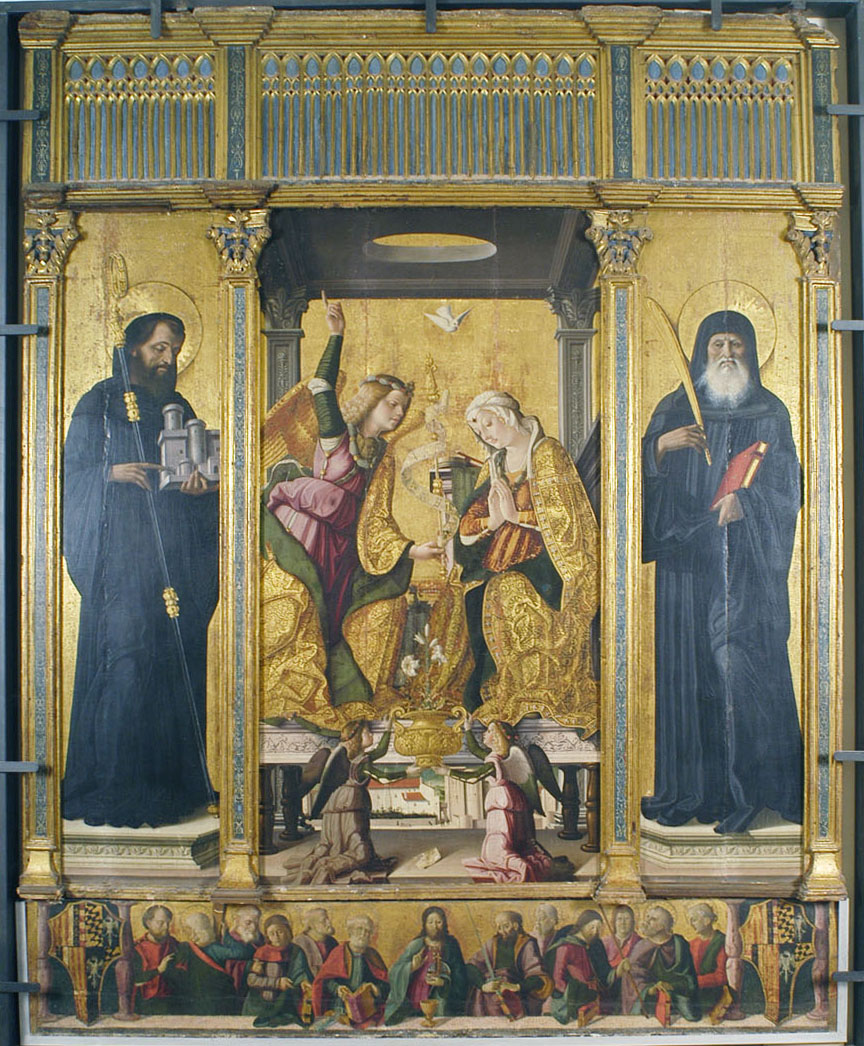 |
| SS Honoratus and Benedict, 1499 |
The martyrology records the feast of St Honoratus of Fondi 'of whom blessed pope Gregory makes mention' as January 16, but in the town of Fondi, of which he is patron, the feast is celebrated on October 10.
St Gregory's mention of the saint comes in the first chapter of Book I of the Dialogues:
In times past one Venantius, a noble man, had a living in the country of Samnium; the farmer whereof had a son called Honoratus, who from his very childhood by the virtue of abstinence did thirst after the joys of heaven: and as in other things he led an holy life, and refrained from all idle talk, so did he much, as I said before, subdue his body by means of abstinence.
His parents, upon a certain day, had invited their neighbours to a banquet which consisted altogether of flesh, whereof because for the love of mortification he refused to eat, his father and mother began to laugh at him, willing him to fall to that which they had: "For can we," quoth they, "get you any fish here in these mountains?" (for in that place they used sometimes to hear of fish, but seldom to see any.)
But whiles they were thus jesting, and mocking at their son, suddenly they lacked water: whereupon a servant with a wooden bucket (as the manner is there) went to the well to fetch some: into which, as he was a drawing, a fish entered in, which upon his return, together with the water, he poured forth before them all. And the fish was so great, that it served Honoratus very well for all that day. At this strange chance all were stroken in admiration, and his parents abstained now from further scoffing at his virtue, and began to have him in reverence for his abstinence, whom before for that very cause they did mock and scorn: and by this means, the fish, brought miraculously from the well, discharged God's servant from that shame, which he had endured through their uncivil jesting.
Honoratus, proceeding forward in virtue, at length was made free by the foresaid Lord Venantius: and afterward, in that place which is called Funda, he built an Abbey, wherein he was the father almost of two hundred monks: and he lived in so great holiness that he gave good example to all the country round about. Upon a certain day, it fell so out, that a stone of an huge greatness, which was digged out of the mountain that hung over the top of his Abbey, tumbled down by the side of the hill, threatening both the ruin of the house and the death of all the monks within: which danger the holy man seeing ready to come upon them, called often upon the name of Christ, and, putting forth his right hand, made against it the sign of the cross, and by that means did he stay it, and pin it fast to the side of that steep hill: which thing Lawrence, a religious man, affirmed to be most true. And because it found not there any place upon which it might rest, it hangeth at this time in such sort, that all which now look upon it do verily think that it would continually fall.
PETER. I suppose so notable a man as he was, and who afterward became master to so many scholars, had himself some excellent teacher of whom he was instructed.
GREGORY. I never heard that he was scholar to any: but the grace of the Holy Ghost is not tied to any law.
The usual custom of virtuous men is, that none should take upon him to rule, who first hath not learned to obey: nor to command that obedience to his subjects, which before he hath not given to his own superiors. Yet some there be which are so inwardly taught by the doctrine of God's holy spirit, that although they have no man to instruct them outwardly, yet do they not want the direction of an inward teacher: which liberty of life notwithstanding is not to be taken for an example by such as be weak and infirm, lest, whiles each one doth in like manner presume to be full of the Holy Ghost, and contemn to learn of any, they become themselves erroneous masters.
But that soul which is full of God's holy spirit, hath for proof thereof most evident signs, to wit, the other virtues, and especially humility, both which if they do perfectly meet in one soul, apparent it is that they be testimonies of the presence of heavenly grace. And so we read not that John Baptist had any master, nor yet that Christ, who by his corporal presence taught his Apostles, took him in amongst the number of his other disciples, but vouchsafed to instruct him inwardly, and left him, as it were, in the sight of the world to his own liberty. So Moses, likewise, was taught in the wilderness, and learned by the Angel what God gave him in charge, which by means of any mortal man he knew not: but these things, as before hath been said, are of weaklings to be reverenced, and not by any means to be followed.